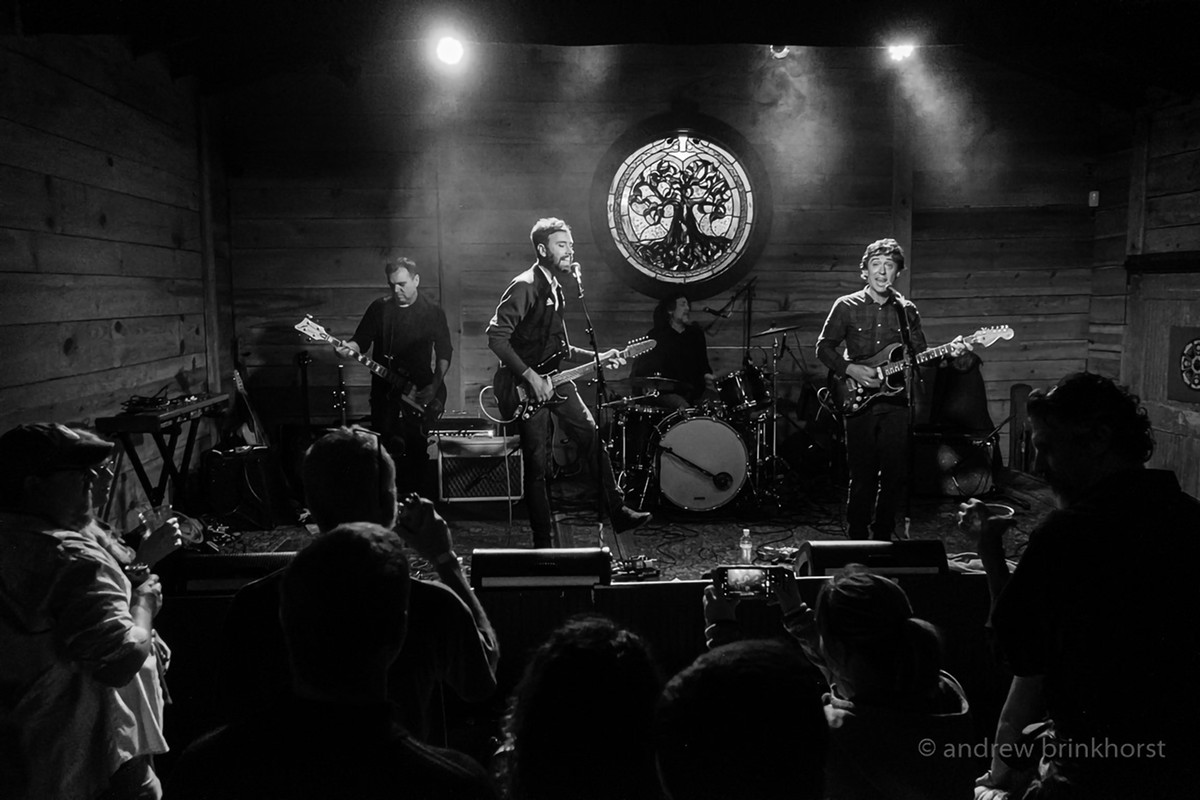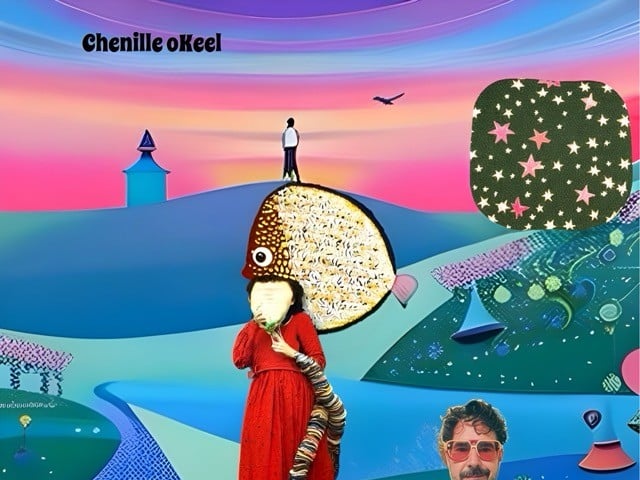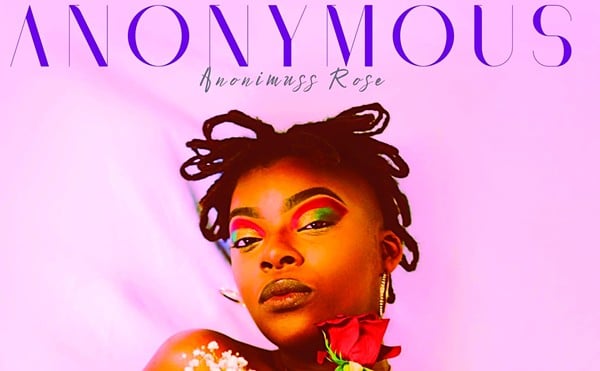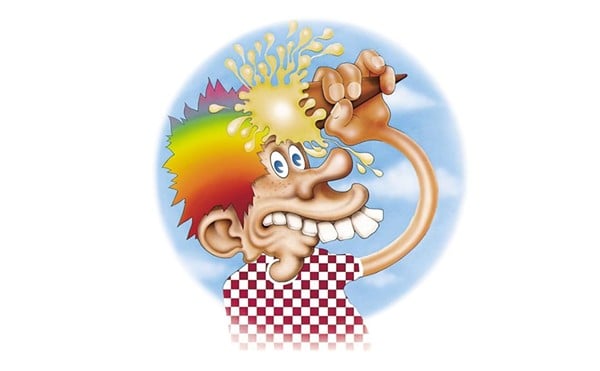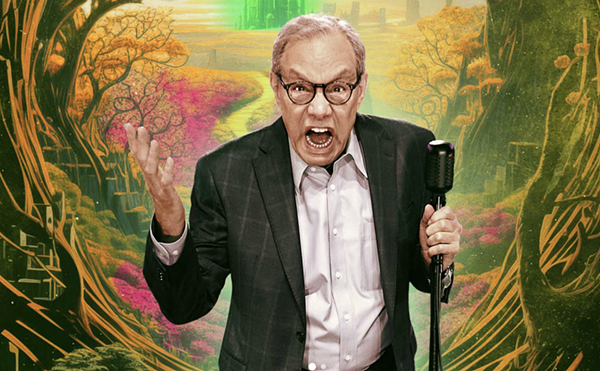If the feeling of complete contentedness had a soundtrack, it would be the music of Letters of Acceptance. How this Louisville/Lexington-hybrid four-piece has been able to turn out some of the most well-written, catchiest, world-class power pop tunes for a few years now while remaining under the radar is beyond me. The band — made up of Louisvillian Clint Newman (guitar, vocals), and Lexingtonians John Norris (guitar, vocals), Scott Whiddon (bass), and Tim Welch (drums) — released three EPs over the course of 2023 into 2024: Shadow Problems 1, 2 and 3, respectively. All 15 tracks from the three EPs have been compiled into a single full-length album, Shadow Problems, which is available now as a digital download and as a nine-song vinyl LP, (the LP comes with the full 15-song album on cd as well). LEO recently caught up with John and Clint, and here’s what they had to say. (This interview has been edited for length and clarity)
LEO: Give us a rundown of your musical past.
John Norris: I had a very musical family growing up, so there were always guitars, banjos, and dulcimers around the house. My family was very involved in Appalachian folk music, so I would often end up at folk festivals and workshops around the state as a child. At the time, I didn’t fully appreciate it and went more towards rock and underground music, but I think a lot of those early experiences have ended up informing what I do now, maybe at a subconscious level. I do realize now that rock songs are just folk songs played loud. Band-wise, I started making little home recordings under the name Harlan in the early 2000’s which eventually became a band that lasted in one form or another for several years.
Clint Newman: My grandmother was a piano teacher and, on rare occasions, would show off by playing “Rhapsody in Blue” from memory or something equally as stunning. That made a big impression. I started taking Suzuki Method piano lessons when I was around 7 or 8 and loved playing by ear, but I could not be bothered to learn to properly read music. Inspired by my discovery of classic rock, I took to guitar quickly around age 15. I wanted to learn to play blues, which I’d say is the foundation of my playing. A few years later I got into major label alt rock which led me to the indie/punk world. Despite playing guitar constantly, I didn’t really start playing in bands until much later when I was living in New York. There I met some great singers/songwriters in a band called The Mendoza Line who were doing what I wanted to do; combining the noisier indie rock world with committed lyricists like Bob Dylan, Elvis Costello, David Berman, etc.
At different times, you’ve both moved away from Kentucky, then moved back. What took you away from the state, and what brought you back?
CN: I left KY for New York to study acting. Gradually music took over the acting. I was there almost 15 years - 10 of those with my wife, who is from Louisville. Practically all our family is here and we never wanted to spend the rest of our lives in NY, so when a long-term job ended we made the jump back to KY.
JN: For me, I moved around the south a lot for art school and then various teaching gigs at universities. I finally came back when I started teaching art at the University of Kentucky.
How did Letters of Acceptance come about?
JN: Clint and I had mutual college friends and then both ended up living in Brooklyn in the early 2000’s, though at slightly different times. When our paths did cross, we’d play music and it always seemed like there was something interesting there. However, we both ended up living in different places and never had a chance to truly collaborate until we both happened to move back to Kentucky around 2016. We worked as a duo for a while, and then Scott Whiddon (bass) and Tim Welch (drums) came on board and that really upped our level musically — they are amazing players and great people to have as part of this experience.
Where do you draw influences from when writing lyrics?
JN: I try not to write words down for a while and just see what comes. They’re usually a series of images and slightly absurd scenarios which are totally inscrutable to me at the time. Then about six months later it’s totally obvious to me what I was writing about. We also collaborate on lyrics, which can be very fun and allows the songs to open up a bit.
CN: My favorite lyrics are the ones you can’t quite get to the bottom of. As an audience I want to be able to return to a song many times and each time have moments where I’m not sure if I’m being led down a dead end or through a door. I don’t think lyrics are poetry but I like reading poetry as inspiration for lyric writing. What was behind the decision to do the three Shadow Problems
EPs in one year?
JN: It was not any kind of predetermined plan. We just were having a lot of fun recording with Scott and Tim for the first time at a great studio, (Otto Helmuth engineered the record at his Lexington studio). Then we suddenly had fifteen songs. That’s when we decided to put five songs out at a time digitally, and then wrap the whole thing up by picking some of our favorites to go on a record.
What Letters of Acceptance song are you most proud of, and why?
JN: I currently like “I Do Not Care / Sound Control Is Mind Control” — in part because it’s just a weirdo two-part song that morphs from a fast krautrock thing into a slow psychedelic ballad. But I also like the story it seems to tell. It begins as a dark portrait of a character that’s fallen into a world of bitterness and conspiracies, and then in the second part it reveals some of the pain and the backstory that’s underneath all that darkness. The way the lyrics and the song structure mirror each other was a satisfying discovery.
CN: I think I’m with John - that’s my favorite right now for all the same reasons. But to be slightly selfish I’ll say I’m pretty happy with “Let Go Disaster”. It grooves, has a big chorus, slippery chord changes, a fake alt country bridge, etc. You can find out more about the band and order their latest album, Shadow Problems, on their website: lettersofacceptance.org

